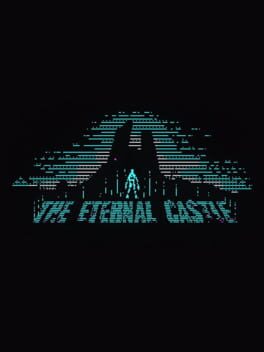As you can clearly tell just from looking at it, Eternal Castle's most appealing asset is its awestrucking MS-DOS inspired visual style that manages to capture what might have been the feeling of witnessing a fleeting burst of bright cyan and pink colors on the screen for the first time from a seemingly standard floppy disk in your parents newly bought home computer. Limitation and restrictiveness always brings about the best of artists, and it's impressive how much detail and personality the devs were able to squeeze out of its monochromatic and pixelized commitment.
Besides this clear visual inspiration, Eternal Castle is obviously paying homage to the old cinematic platforming genre established by Prince of Persia, and further iterated on by more artistically pursuing games like Another World and Flashback. Eternal Castle doesn't try to reinvent the wheel, nor does it seem to want to do that, utilizing instead the pre established formula of realistic running and jumping to focus on short moments of tension and action that define those games, while stripping away the more commonly maligned criticisms inherent to the genre like trial and error deaths, frustrating controls and obtuse puzzle solving.
Clocking at around 3 hours, Eternal Castle wastes no time getting into the action right after an exposition wall of text dump and a short and thrilling intro cutscene, allowing the gameplay to take the reins of the storytelling from that point on. The narrative, nature and motivations of the characters you encounter and the world you walk through is deliberately made obtuse and secretive, opting to let the imaginative dystopic backgrounds and action platforming setpieces do the talking. Taking note from Another World, Eternal Castle understands that the pure interactive act of wanting to surpass a challenge to see what's on the next screen is enough to keep the player invested, framing the core gameplay with its beautiful presentation and disguising what might be a very simple story with enough mystery and breadcrumbs to engage you on figuring it out for yourself, not unlike Hyper Light Drifter. And that's totally my jam.
The gimmicky marketing campaign that pretends this is a remaster of a forgotten 1987 game unfortunately amounts to little or nothing in the actual game itself, a trick reminiscent of Superhot. It's a clever way of signaling the nostalgia sector in your brain, even for those who never actually experienced said influences, that ends up being a disservice to the actual game, considering how much originality and identity it ends up having. Definitely an underrated one you should waste a couple hours on.
Besides this clear visual inspiration, Eternal Castle is obviously paying homage to the old cinematic platforming genre established by Prince of Persia, and further iterated on by more artistically pursuing games like Another World and Flashback. Eternal Castle doesn't try to reinvent the wheel, nor does it seem to want to do that, utilizing instead the pre established formula of realistic running and jumping to focus on short moments of tension and action that define those games, while stripping away the more commonly maligned criticisms inherent to the genre like trial and error deaths, frustrating controls and obtuse puzzle solving.
Clocking at around 3 hours, Eternal Castle wastes no time getting into the action right after an exposition wall of text dump and a short and thrilling intro cutscene, allowing the gameplay to take the reins of the storytelling from that point on. The narrative, nature and motivations of the characters you encounter and the world you walk through is deliberately made obtuse and secretive, opting to let the imaginative dystopic backgrounds and action platforming setpieces do the talking. Taking note from Another World, Eternal Castle understands that the pure interactive act of wanting to surpass a challenge to see what's on the next screen is enough to keep the player invested, framing the core gameplay with its beautiful presentation and disguising what might be a very simple story with enough mystery and breadcrumbs to engage you on figuring it out for yourself, not unlike Hyper Light Drifter. And that's totally my jam.
The gimmicky marketing campaign that pretends this is a remaster of a forgotten 1987 game unfortunately amounts to little or nothing in the actual game itself, a trick reminiscent of Superhot. It's a clever way of signaling the nostalgia sector in your brain, even for those who never actually experienced said influences, that ends up being a disservice to the actual game, considering how much originality and identity it ends up having. Definitely an underrated one you should waste a couple hours on.
